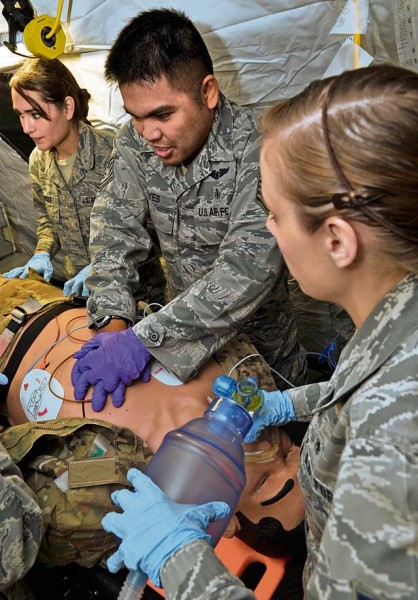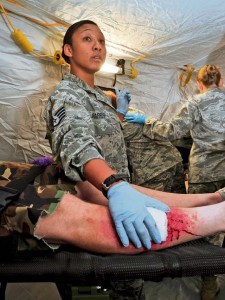
U.S. Air Forces in Europe and Air Forces Africa medical units participated in Expeditionary Medical Support training to challenge their medical readiness skills Aug. 25 through 30 on Ramstein.
The training was set to challenge their knowledge and capabilities along with their ability to utilize medical field equipment for humanitarian operations.
The EMEDS training included realistic scenarios for the Airmen, where the Airmen had to perform emergency medical treatments that allowed them to use all their medical skills in a hands-on environment.
“The training keeps the Airmen ready for humanitarian missions by getting them familiar with the equipment they would be using downrange,” said Maj. Joseph Indomenico, 86th Medical Squadron medical logistics flight commander. “The input that we get back from the training helps us further advance our training program.”
The training also tested the humanitarian response team’s ability to quickly construct a mobile hospital, capable of assisting more than 200 hundred patients.

“These mobile hospitals are the same ones we use in the field. It’s essential that our Airmen are efficient and timely with construction of the tents so they can get them up and running to save as many lives as possible,” Indomenico said.
Cadres from Camp Bullis, Texas, oversaw participant’s emergency response capabilities and provided feedback to the units.
“We come over here from Camp Bullis (Texas) to better prepare all Air Force medical units in a field setting,” said Maj. Leticia Bland, 737th Training Support Squadron EMEDS support cadre. “We ensure that all our Airmen can provide the best medical care to those in need.”
The EMEDS training allowed the HRT the opportunity to get a feel of a deployed environment and allowed them to test their medical abilities.
“We are going to make sure by the end of the week all the units here will have either revamped or heightened their level of medical and equipment knowledge,” said Maj. Roger Bermea, 381st Training Squadron EMEDS element chief.


